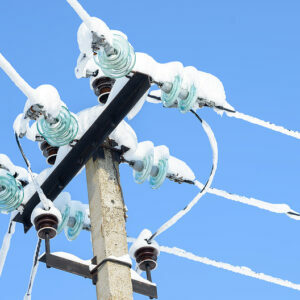New England’s power grid won’t be able to sustain itself through a prolonged cold snap this winter, as fuel for generating electricity and heating homes becomes more expensive and more scarce, the grid’s operators warned Monday. The result could be “controlled power outages” leaving some Granite Staters in the cold and dark.
During a press briefing on the upcoming winter’s outlook, ISO New England president and CEO Gordon van Welie said when temperatures fall to the extreme, the region’s electric generation system relies on liquid natural gas (LNG) and fuel oil to power the grid.
“In recent years, oil and LNG have filled the gaps when extended periods of very cold weather have constrained natural gas pipeline supplies,” van Welie said. “Higher prices globally for these fuels, as well as pandemic-related supply chain challenges, could limit their availability in New England if needed to produce electricity this winter. The region would be in a precarious position if an extended cold snap were to develop and these fuels were not available.”
So precarious, in fact, they could result in rolling blackouts.
One reason is the limited supply of natural gas via pipelines, which are the safest and most reliable way to move fuel. Policies in the blue states of New York and Massachusetts have all but blocked New England’s access to more of the abundant natural gas available from Pennsylvania, which produces more than a fifth of the nation’s supply.
Another issue is the global energy market, van Welie said, as Europe and Japan become more reliant on LNG. With prices for LNG in Asia and Europe nearly double what it is in New England, it makes sense that most LNG producers are shipping their supplies overseas.
“These limitations are in addition to typical logistical challenges, such as inclement weather, that can affect fuel deliveries into the region,” van Welie added. “A national shortage of truck drivers may also affect the speed at which some generators can replenish their fuel supplies, as the trucking system is shared by multiple industries, including commercial and residential heating and electric generation.”
Efforts to address this challenge by either building more power plants or natural gas pipelines have been blocked.
The net result is New Englanders pay some of the highest energy prices in the nation for power from a grid that’s under ever more stress. Five of the top 10 states for highest electricity rates in the continental U.S. are in New England. (Maine is number 11.)
Across the nation, home heating oil prices have risen from an average of $2.55/gal to $3.55/gal today. Propane prices have jumped from $1.88/gal to $2.71/gal in the past year.
New England is expected to see a mild winter during the 2021-22 season. However, according to van Welie, weather is uncertain and extreme cold snaps are not out of the question given climate change. And, he noted, the region came within days of running out of fuel in the winter of 2017-18, he said.
Peter Brandien, ISO New England’s vice president of system operations and market administration, said the COVID-19 pandemic is also playing a role. More people working from home means more power consumption, as more individuals turn a spare bedroom into an office rather than sharing a common space with many other people. And now more businesses have reopened and are using power, too.
“It’s a double whammy,” he said. “We’re trying to get everyone to understand the issues.”
Brendien said ISO New England will be issuing 21-day forecasts for utilities and governments to be able to make better choices about power needs in advance. One emphasis will be urging conservation during extreme weather. Brabdien said people could be encouraged to turn down their thermostats and limit using appliances like washing machines and electric stoves during cold spells.
If not, controlled power outages are not out of the question.
“We operate in winter very close to the edge here in New England,” van Welie said. “The 15 million people in New England need to understand the precarious position we are in when we have an extended period of extreme cold weather.”
Van Welie acknowledged alternatives to fossil fuels are necessary, but there needs to be a plan in place. Hydroelectric power from Quebec could be part of the solution, but it’s not the complete answer, he said. The region needs to consider investing in a system that allows for up to two weeks of power generation using a source that doesn’t need to be imported.
A modular nuclear reactor could take care of the problem, he said, but in the current political climate is unlikely to get approved. Green fuels, like green hydrogen, are prohibitively expensive. That means power generators need LNG and oil to bridge the gap, and those power plants need to have a reliable reserve.
“Lots of actions have been attempted over the years. Unfortunately, we still haven’t solved this problem,” van Welie said. “The region needs a more robust solution than what we have.”




